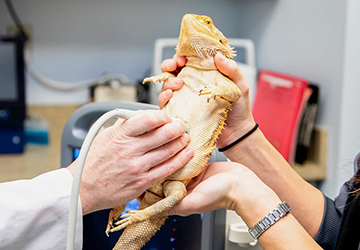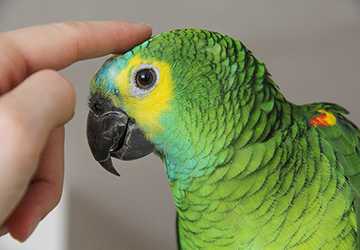Why Regular Vet Visits Are Essential for Exotic Pets
When we talk about pets, dogs, and cats are the first to come to mind. However, pet ownership often extends to more unusual and unique creatures, from iguanas and hedgehogs to parrots and tarantulas. While these exotic pets offer different companionship, they also require specialized care. One critical aspect of this care is ensuring regular visits to a vet specializing in exotic animals. Here, we discuss the importance of unknown pet healthcare, delve into some common health issues in exotic animals, highlight vet recommendations for exotic pets, and help pet owners identify signs of illness in exotic pets.
Importance of Exotic Pet Healthcare
Exotic pets, by nature, have specific needs that can vastly differ from common domesticated animals. The average pet owner might need to understand better their natural habitats, diets, and behavioral patterns. This makes the importance of exotic pet healthcare paramount. Regular vet check-ups ensure:
● Dietary Needs: Exotic animals have unique nutritional requirements. A vet can guide owners on the ideal diet, supplements, and feeding schedules.
● Habitat Guidance: Ensuring the pet's living environment mirrors its natural habitat as closely as possible is vital. Regular vet consultations can offer insights into perfecting this environment.
● Preventive Care: Just like cats and dogs, exotic pets benefit from preventive care, which might include vaccinations, parasite control, and regular health screenings.

Common Health Issues in Exotic Animals
Awareness of common health issues in exotic animals is essential for proactive care. Some of these issues include:
● Nutritional Deficiencies: Incorrect diets can lead to various health problems, from metabolic bone disease in reptiles to fatty liver disease in birds.
● Respiratory Infections: Many exotic pets, especially reptiles, are prone to respiratory infections if kept in incorrect humidity or temperature.
● Parasites: Internal and external parasites can plague exotic pets, impacting their health and comfort.
Vet Recommendations for Exotic Pets
When vetting recommendations for exotic pets, finding a specialist is vital. Not all vets are trained to handle the unique needs of exotic animals. Some recommendations include:
● Specialized Vets: Always choose a vet with experience and training in treating exotic animals.
● Regular Check-ups: Annual or bi-annual visits can catch potential issues early, even if your pet seems healthy.
● Emergency Care: Ensure you know of an emergency exotic vet in your area. Exotic pets can sometimes hide symptoms until critically ill, necessitating urgent care.
Identifying Signs of Illness in Exotic Pets
Identifying signs of illness in exotic pets can be challenging due to their ability to mask symptoms. However, some general signs to watch for include:
● Changes in Behavior: A usually active pet becoming lethargic or a typically calm animal becoming aggressive can signal underlying issues.
● Altered Eating Habits: A reduced appetite or sudden overeating can indicate health problems.
● Physical Changes: Weight loss, unusual growths, shedding issues in reptiles, or feather plucking in birds can all be signs of health concerns.
Understanding the Origin and Natural Behavior
To provide the best care for exotic pets, it's essential to understand their natural habitat and behavior.
● Natural Habitat Study: Whether your pet is a desert-dwelling lizard or a tropical bird, understanding their natural habitat can provide insights into their care needs. Temperature, humidity, lighting, and even the seasonal changes they experience in the wild can help inform how you create their environment at home.
● Social Needs: Some exotic animals are naturally solitary, while others are more social. For example, while some parrots thrive on interaction and should be allowed out of their cages regularly, certain reptiles might find too much handling stressful.
Safety Concerns for Exotic Pet Owners
Ownership of exotic pets isn't just about the animal's health; it's also crucial to consider the owner's and others' safety.
● Zoonotic Diseases: Some diseases can transfer from animals to humans. Regular vet visits and understanding potential health risks can help prevent such issues.
● Handling Techniques: Proper handling techniques, especially for reptiles or larger exotic pets, can prevent potential bites or injuries to the owner.
Ethical Considerations and Legalities
● Ethical Sourcing: Ensuring your exotic pet is sourced ethically is crucial. Many animals suffer in the illegal pet trade, and supporting such practices can harm them and their natural habitats.
● Legal Considerations: Not all exotic pets are permitted in every jurisdiction. Before committing to a strange animal, ensure you know local regulations regarding their ownership and care.

Special Equipment and Training
Exotic pets often require specialized equipment for their care and habitat.
● Training: Some exotic pets, like certain birds or even primates, require training for both the pet and the owner. This training includes behavior management, trick training, or potty training.
● Equipment: From UVB lights for reptiles to misting systems for amphibians or high-quality air filters for birds, investing in the right equipment is vital for the health and happiness of your pet.
Life Expectancy and Long-Term Care
When considering adopting an exotic pet, one should be aware of the lifespan of the creature:
● Life Span: Some exotic pets have surprisingly long lifespans. Certain tortoises can live for over a century, while some parrots can live for 50 years or more. Understanding the long-term commitment involved is crucial before adopting such pets.
● Future Planning: Given the potentially long lifespan of some exotic animals, it's wise to consider future arrangements for them should they outlive their owner.
Mental and Physical Stimulation
Ensuring that exotic pets are mentally and physically stimulated is vital for their overall health and happiness:
● Toys and Puzzles: Many exotic animals like cats and dogs enjoy toys. For instance, parrots can benefit from puzzle toys that challenge them mentally, while ferrets love tunnels and play areas.
● Interaction and Training: Many exotic animals thrive on interaction, especially birds and mammals. Training sessions about basic commands, tricks, or agility can stimulate and strengthen the bond between pet and owner.
Caring for exotic pets is a remarkable journey that demands dedication, research, and passion. As we delve deeper into understanding these unique creatures' needs, we find that the bond formed between owner and pet becomes even more vital. While significant, exotic pet care challenges pave the way for a profoundly enriching experience for those willing to commit to their well-being.




